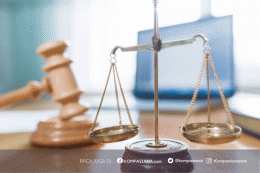In legal logic, a lawsuit against a judge after granting amnesty or abolition is a legally absurd step. This directly contradicts the principle of res judicata pro veritate habetur, which states that every judge's decision is considered correct and legally binding until overturned by a higher court through an appeal, cassation, or judicial review mechanism (Mertokusumo, 2009). This principle is the foundation of the stability of the judicial system, because without it, every decision will continue to be challenged endlessly, eroding legal certainty which is one of the pillars of the rule of law ( rechtsstaat ) (Asshiddiqie, 2010).
Amnesty and abolition, as stipulated in Article 14 of the 1945 Constitution of the Republic of Indonesia and Emergency Law No. 11 of 1954, were never intended to be instruments to justify judges' errors in ruling. Both are legal political policies ( statecraft ) issued by the President for the greater good: national reconciliation, political stability, or the protection of the country's strategic interests (Habermas, 1996). Therefore, suing a judge after receiving a pardon is a fundamental misunderstanding of the function and nature of these two instruments.
Constitutionally, the President's prerogative falls within the executive branch, while judicial decisions fall within the judicial branch. Blurring this line by considering pardons as evidence of judicial error undermines the separation of powers , the foundation of modern democracy (Montesquieu, 1748/1989). This logical confusion not only undermines the President's authority but also undermines the authority of the judiciary.
Furthermore, this phenomenon carries the risk of abuse of rights ---the misuse of legal rights for illegitimate purposes (Ruiter, 2001). In this case, the right to sue is used not to seek justice, but rather to delegitimize the judicial institution and create a public narrative that a legally enforced decision is wrong. Philosophically, state prerogatives---including amnesty and abolition---are forms of forgiveness, not additional ammunition for political or personal warfare.
From a public ethics perspective, a recipient of amnesty or abolition should display an attitude of constitutional gratitude ---respect for the President who granted the pardon and respect for the judge who carried out his duties as mandated by law. Turning a pardon into a springboard for attacking the judge is a denial of the moral meaning of the pardon itself. It's like someone rescued from a storm then cursing the ship that brought them to shore.
This phenomenon also reveals a deeper crisis in our political life: the loss of a mystical sense of nationalism . The nation's founders envisioned the republic not merely as an arena for political competition, but as a spiritual-collective forum that embodies the ideals of independence as a sacred mandate (Notonagoro, 1975). The Pancasila democracy they formulated is one rooted in mutual cooperation, deliberation, and an orientation toward the interests of the nation, rather than individualistic or narrow group interests.
Unfortunately, the current democracy often produces politicians who have lost their connection to national consciousness. Their focus is reduced to mere self-preservation or group interests , ignoring the noble vision of the republic. Within this framework, it's not surprising that state forgiveness, which should be a symbol of wisdom, is instead twisted into a political weapon.
The mystical consciousness of nationalism teaches that personal interests must be subsumed by the interests of the nation. Therefore, recipients of amnesty or abolition, if they still adhere to this consciousness, will view forgiveness as the end of a conflict, not the beginning of a new chapter of counterattack. This is where we need political leadership. who has the soul of a statesman, not just a political player who is adept at exploiting legal loopholes.
The normative solution requires reaffirming in regulations and legal doctrine that recipients of amnesty or abolition cannot use legal instruments to challenge judges' final decisions unless there is clear evidence of ethical or criminal violations. Ethically, political and legal education for public leaders must reinstill national values rooted in Pancasila democracy and the vision of the nation's founders.
In this way, we not only fortify the legal system against abuse of rights, but also restore our political integrity. Without this restoration, the President's prerogative will continue to be vulnerable to abuse, and the judicial system will always be threatened by legally irrelevant lawsuits. Ultimately, what we need is not only legal certainty, but also a collective awareness that this republic is founded on the principle of mutual respect between the branches of government, for the sake of the priceless ideal of independence.
Abuse of the President's Prerogative
In the Indonesian constitutional system, the President's prerogative to grant amnesty and abolition is a manifestation of the principle of checks and balances between the executive, legislative, and judicial branches of government. This right, as stipulated in Article 14 of the 1945 Constitution, is not simply the President's absolute freedom, but rather an authority limited by constitutional mechanisms, namely the consideration of the House of Representatives. It embodies a legal political mandate to safeguard national interests and promote social reconciliation.







